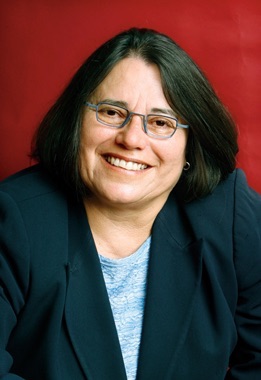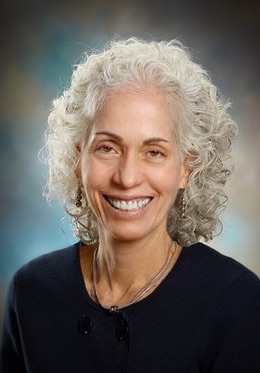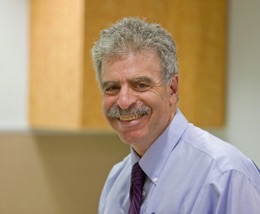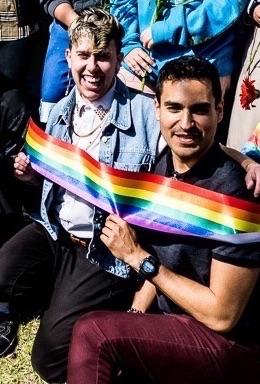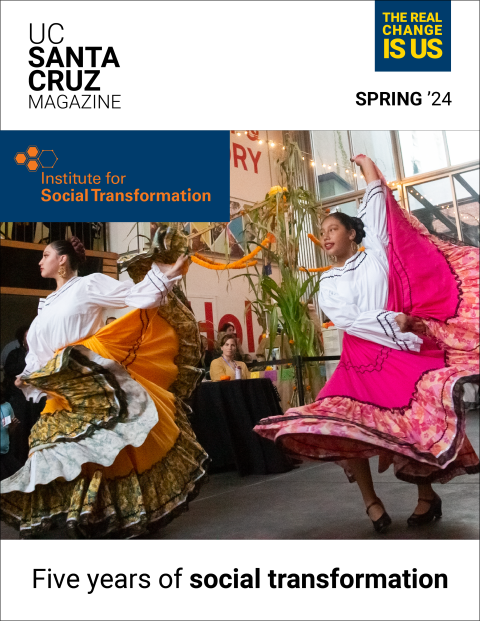In an extraordinary testament to the value of a Community Studies education at UC Santa Cruz, the directors of the county public health departments in both San Francisco and Los Angeles are graduates of the program. And both women are returning to campus this spring as guest lecturers in a special-edition public health class offered by Community Studies.
The class features eight alumni speakers, including Barbara Garcia (Oakes College '84, community studies) and Barbara Ferrer (Rachel Carson College '78, community studies), directors of the San Francisco and Los Angeles County departments, respectively. The class is part of Community Studies’ year-long 50th anniversary celebration, and guest speakers from every decade will discuss their professional paths and lecture on the subject of their expertise; topics include community health care, the opioid crisis, mental health in disaster areas, the gender revolution, and leadership development for global health.
Garcia credits Community Studies with validating her interest in community-engaged health care.
"Community Studies was a really important program for me," said Garcia. "It accepted and embraced community activism, and provided the theoretical base that supported my career."
Health has always been a focus of Community Studies, said course instructor Andrea Steiner. The emphasis is on "health justice," which includes analysis of the production, accessibility, and quality of health care, as well as "social determinants" of health. "Access to fresh air, good food, and housing are all determinants of health," noted Steiner.
Seventy students have enrolled in the class, said Steiner, who teaches the course every other year. The class meets twice weekly, with alumni participants appearing on Monday night, followed by a lecture and discussion on Wednesday afternoon.
Community engaged public health
Garcia, who was the first in her family to attend college, stayed in Santa Cruz after graduating in 1984. She helped build food and nutrition programs for farmworkers in Watsonville and was instrumental in opening a free medical clinic that would become the Salud Para la Gente Health Clinic; she was executive director until 1995, overseeing programs that serve thousands of farm worker families every year.
As director of the San Francisco public health department, a position she has held since 2011, Garcia administers a $2 billion budget, more than 8,000 employees, dozens of medical clinics, two hospitals, a skilled nursing facility, and hundreds of organizations that provide mental health and substance abuse services. Garcia said her work involves a "lot of the same philosophies and practices" she learned in Community Studies, particularly around community engagement.
"It's about collective impact and how you bring people together to maintain and improve health," she said, citing the city's Getting to Zero SF program. With a mission of reducing the transmission, death, and stigma of HIV/AIDS to zero by 2020, Getting to Zero is an example of a program that is only as strong as its many partners. "That's the vision. It's going to be a real big lift, given the disparities in access to care, but it's the vision of hundreds of people," she said.
Garcia said her message for undergraduates will focus on how to look at a community and, using public health concepts, identify its overall health. Garcia, who spoke at the Oakes College graduation ceremony a few years ago, said the opportunity to come back as a teacher is "part of the circle of giving back."
Community Studies "kept me in college," she said. "It was easy to get disillusioned, in the face of all the great needs in our community. It was an acknowledgement of the importance of community work."
Field-study experiences set graduates on their path
Community Studies majors are required to complete a six-month field study, and many students choose health-related internships. Students gain hands-on experience and skills that help them get jobs after graduation; for many, their field study experiences have a lasting impact on their career path.
"They have no idea how much they're going to get out of it," said Steiner, who does a lot of academic advising, too. "We spend a lot of time on preparation, and students all say the same thing: 'They had other interns, but I was treated like staff.' "
Alumni guest speaker Dan Cooper (Merrill College '70, community development) spent six months on a kibbutz in Israel as part of an independent major that was a precursor to Community Studies. Today, Cooper is a professor of pediatric medicine and the associate vice chancellor for clinical and translational science at UC Irvine. As the guest speaker on April 30, Cooper will discuss "Bringing Lab Science to Real World Health Care."
Cooper arrived at UC Santa Cruz a year after the campus opened, drawn by the ways in which it was a "departure from all the other UCs." Eager to make a contribution to society, he was already thinking about medical school and loved the independence of designing his own major.
"I didn't want to major in science, because I didn't think that would be taking advantage of all that was being offered," he said, recalling three "phenomenal" courses: "The History of the American Dream of Success," "Stability and Change in the USSR," and "Introduction to Genetics." "I'm better educated than 99 percent of my colleagues in medicine," he added.
A pediatrician who specializes in childhood lung disease, Cooper has worked in developing countries, El Salvador, and Mexico. "Santa Cruz motivated me to work at the community level," he said.
Twenty years ago, Cooper joined the faculty at UC Irvine, tasked with establishing a general clinical research center that would support the National Institutes of Health's infrastructure and "get people-oriented research done." "The community part is written in," he said. "I had that skillset from Santa Cruz."
About a decade ago, that initiative morphed into a Clinical Translational Science Award, dedicated to speeding up the process of moving research discoveries from the lab to the clinical setting. Cooper leads that initiative.
Cooper plans to talk with students about today's emphasis on "patient-centered outcomes" as an evolution of ideas he was first exposed to during college. "The emphasis on community and doing stuff for society--it's nothing new," he said. "I studied it as a student at UC Santa Cruz in 1967."
The Gender Revolution
The most recent graduate to guest lecture in Steiner's course is Jamie Joy (Stevenson College '16, community studies and feminist studies), the LGBTQ youth program coordinator for The Diversity Center in Santa Cruz, who will talk about "Improving Health through Access to Education: The Gender Revolution."
Today's gender expansiveness is the latest phase of a movement that has evolved over the course of many decades to give people options beyond "being forced into one of two boxes," said Joy. "Our gender identities are related to all our other identities—where we grew up, how we were raised and taught. How we identify and express our gender is complex and dynamic."
Community Studies was the perfect fit for Joy, who appreciated its interdisciplinary approach. "Community Studies offers opportunities to do work that's meaningful not just for your education but for your community," said Joy.
Joy, who uses gender neutral pronouns, was first involved in public health as a sexual health peer educator and HIV peer test counselor at UCSC. During their field-study placement at The Diversity Center, they managed two initiatives: analyzing the results of a survey of 140 LGBTQ youth in Santa Cruz County high schools, and creating a two-hour sex-education curriculum for LGBTQ youth.
"Santa Cruz isn't as ahead of the curve as we imagine ourselves to be," Joy said of the survey results. Many queer youth reported witnessing and experiencing bullying, and few saw themselves or the LGBTQ community represented in the high school curriculum.
The field-study internship led directly to a job after graduation. Today, Joy co-facilitates queer youth groups that meet weekly in Watsonville and Santa Cruz, supports Gender Sexuality Alliances at county schools, and organizes large-scale events like camping trips, marches and rallies, open mics and mixers, and an annual prom for queer youth. Joy's most recent accomplishment was helping queer youth create a mural at Louden Nelson Community Center that celebrates the LGBTQ community.
"At UCSC, I was focused on resources for college students, but now I want to go earlier," said Joy. "Education about gender, consent, sexual health, and bodies should happen as young as possible—in age-appropriate ways, of course."
Broad interest in public health
The willingness of alumni like Joy, Cooper, and Garcia to come back to teach has been gratifying, said Steiner. Community Studies graduates feel deep bonds to the program and the campus, she said.
Steiner has taught in Community Studies for 18 years. Interest in public health has been a constant, and the class attracts students from a wide range of disciplines, including human biology, psychology, and anthropology.
"Some take it because they think it will help them get into medical school, but the social dimensions of health are new concepts for them—things like the number of uninsured, or the impact of living under a highway on a mother's health," she said. "It's mind blowing for them—in a good way. Getting the science students talking to the feminist studies students is really great."
In its 50th year, Community Studies is more timely than ever, said Steiner.
"Pick a field—anything to do with making a better world—and you'll find Community Studies graduates," said Steiner. "What makes this major so inspiring is that these students are serious and really dogged about their pursuit of equity and justice—in health and so many other realms. Our motto is true: We are everywhere."
